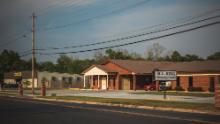[ad_1]
The reopenings will, necessarily, lead to an increase in coronavirus cases as people leave their homes and interact with others outside their isolation bubbles. Still, the officials are hoping these increases are manageable, and that they are offset by a rejuvenated economy.
“We have more people moving around, we’re probably going to have to see our cases continue to go up, but we’re a lot better prepared for that now than we were over a month ago,” Georgia Gov. Brian Kemp said Monday. “But like I said in my remarks, if we have an instance where a community starts becoming a hot spot, then, you know, I will take further action.”
Will business owners put themselves and their employees at risk in exchange for revenue? Will residents feel safe enough to go out to a shop and interact with strangers?
Here’s a look at where Georgia, South Carolina and Tennessee stand and their plans ahead:
Georgia
The aggressive decision is striking both for the wide breadth of its reopenings and because the state has not reached the White House’s guidelines to do so.
There is no way to properly socially distance at a barbershop, nail salon or massage therapy business. Gyms and bowling alleys require that people touch the same equipment, which can also spread the virus.
That has not yet happened in Georgia. According to data from Johns Hopkins University, Georgia had 3,800 new cases the week that ended April 5, 6,000 new cases the week that ended April 12, and 5,700 new cases last week. The day-to-day case tally has fluctuated and shown no clear trend; just on Monday, there were about 1,100 new coronavirus cases, more than any of the five previous days.
In all, over 19,000 people have tested positive for coronavirus, and 774 people have died, according to data from Johns Hopkins University.
Local officials said they were struggling to understand the basic logic of Kemp’s decision.
“I’m perplexed that we have opened up in this way, and again I can’t stress enough, I work very well with our governor, and I look forward to having a better understanding of what his reasoning is,” Atlanta Mayor Keisha Lance Bottoms said. “But as I look at the data and as I talk with our public health officials, I don’t see that it’s based on anything that’s logical.”
“I don’t know how you get a haircut and keep a safe distance from someone who is cutting your bangs, it just doesn’t make sense to me,” she added.
CNN’s chief medical correspondent Dr. Sanjay Gupta said he was “very concerned” about the governor’s decision.
“This one is not a tough call,” he said. “It doesn’t meet the most basic guidelines.”
South Carolina
South Carolina, too, is starting to reopen even though it does not meet the White House’s suggested reopening guidelines.
At a news conference, McMaster said he’d like to “stomp on the gas” and accelerate as fast and as safely as they can. He announced a group called “Accelerate SC” with 29 participants across various industries.
“We want to be able to slingshot around the competition and get back up to full speed as soon as we can,” he said.
South Carolina has had over 4,400 coronavirus cases, including 64 new cases on Monday. State epidemiologist Dr. Linda Bell admitted the state has not seen a significant downward trend in coronavirus cases for 14 days, as the White House recommended.
McMaster said that those are good guidelines, but that he also relies on professional opinions in South Carolina and the fact that people seem to be complying with social distancing.
Columbia Mayor Steve Benjamin said the decision to reopen was made based on arbitrary dates rather than data.
“We need more testing, we need more data, and then we can decide how we go back in the business, recognizing there will be a new normal as to how we do business here,” he said. “But the challenge is in places like Florida and Georgia, and yes, even here in South Carolina. There is not that dialogue that is data-focused rather than these arbitrary dates our governors keep laying out.”
“I worry that our friends and neighbors in Georgia are going too fast too soon,” Graham tweeted.
Tennessee
Tennessee Gov. Bill Lee announced his statewide stay-at-home order will expire April 30, and the vast majority of businesses in 89 counties are allowed to reopen on May 1. Businesses may open even sooner, he said.
“Our Economic Recovery Group is working with industry leaders around the clock so that some businesses can open as soon as Monday, April 27,” Lee said. “These businesses will open according to specific guidance that we will provide in accordance with state and national experts in both medicine and business.”
Lee said that his administration will work with some of the state’s most populated counties and their health departments as they plan their own reopening strategies, including the counties surrounding Memphis, Nashville, Chattanooga and Knoxville.
“While I am not extending the safer at home order past the end of April, we are working directly with our major metropolitan areas to ensure they are in a position to reopen as soon and safely as possible,” said Lee. “Social distancing works, and as we open up our economy it will be more important than ever that we keep social distancing as lives and livelihoods depend on it.”
Tennessee has had over 7,200 confirmed cases and 152 deaths so far in the pandemic.
CNN’s Christina Maxouris, Paul LeBlanc, Ethan Cohen, Natasha Chen, Lindsay Benson, Devon Sayers and Tina Burnside contributed to this report.





















